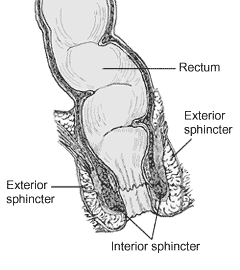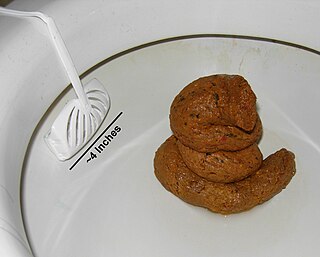See also
- Category:Diarrhea ( 28 )
- Defecation
- Shit , a word originally referring to diarrhea
Diarrhea or diarrhoea is liquid defecation.
Diarrhea may also refer to:

Toilet humour, potty humour or scatological humour, is a type of off-colour humour dealing with defecation, urination and flatulence, and to a lesser extent vomiting and other bodily functions.
Shit is an English-language profanity. As a noun, it refers to fecal matter, and as a verb it means to defecate; in the plural, it means diarrhea. Shite is a common variant in British and Irish English. As a slang term, shit has many meanings, including: nonsense, foolishness, something of little value or quality, trivial and usually boastful or inaccurate talk or a contemptible person. It could also be used to refer to any other noun in general or as an expression of annoyance, surprise or anger.

Diarrhea, also spelled diarrhoea or diarrhœa, is the condition of having at least three loose, liquid, or watery bowel movements in a day. It often lasts for a few days and can result in dehydration due to fluid loss. Signs of dehydration often begin with loss of the normal stretchiness of the skin and irritable behaviour. This can progress to decreased urination, loss of skin color, a fast heart rate, and a decrease in responsiveness as it becomes more severe. Loose but non-watery stools in babies who are exclusively breastfed, however, are normal.

Dysentery, historically known as the bloody flux, is a type of gastroenteritis that results in bloody diarrhea. Other symptoms may include fever, abdominal pain, and a feeling of incomplete defecation. Complications may include dehydration.
Number Two, No. 2, or similar may refer to:

Defecation follows digestion, and is a necessary process by which organisms eliminate a solid, semisolid, or liquid waste material known as feces from the digestive tract via the anus or cloaca. The act has a variety of names ranging from the common, like pooping or crapping, to the technical, e.g. bowel movement, to the obscene (shitting), to the euphemistic, to the juvenile. The topic, usually avoided in polite company, can become the basis for some potty humor.
Continuum may refer to:
Evacuation or Evacuate may refer to:

Fecal incontinence (FI), or in some forms, encopresis, is a lack of control over defecation, leading to involuntary loss of bowel contents — including flatus (gas), liquid stool elements and mucus, or solid feces. FI is a sign or a symptom, not a diagnosis. Incontinence can result from different causes and might occur with either constipation or diarrhea. Continence is maintained by several interrelated factors, including the anal sampling mechanism, and incontinence usually results from a deficiency of multiple mechanisms. The most common causes are thought to be immediate or delayed damage from childbirth, complications from prior anorectal surgery, altered bowel habits. Reported prevalence figures vary: an estimated 2.2% of community-dwelling adults are affected, while 8.39% among non-institutionalized U.S adults between 2005 and 2010 has been reported, and among institutionalized elders figures come close to 50%.
Elimination may refer to:
Catharsis is Greek word meaning "cleansing" or "purging".
Enterocolitis is an inflammation of the digestive tract, involving enteritis of the small intestine and colitis of the colon. It may be caused by various infections, with bacteria, viruses, fungi, parasites, or other causes. Common clinical manifestations of enterocolitis are frequent diarrheal defecations, with or without nausea, vomiting, abdominal pain, fever, chills, and alteration of general condition. General manifestations are given by the dissemination of the infectious agent or its toxins throughout the body, or – most frequently – by significant losses of water and minerals, the consequence of diarrhea and vomiting.
Caca or CACA may refer to:
Diarrheic shellfish poisoning (DSP) is one of the four recognized symptom types of shellfish poisoning, alongside paralytic shellfish poisoning, neurotoxic shellfish poisoning and amnesic shellfish poisoning. As the name suggests, it mainly manifests as diarrhea. Abdominal pain, nausea and vomiting may also occur.
Anal hygiene refers to practices that are performed on the anus to maintain personal hygiene, usually immediately or shortly after defecation. Anal cleansing may also occur while showering or bathing. Post-defecation cleansing is rarely discussed academically, partly due to the social taboo surrounding it. The scientific objective of post-defecation cleansing is to prevent exposure to pathogens.
Dookie is the third studio album and the major label debut by American punk rock band Green Day.

Human feces or faeces, commonly and in medical literature more often called stool, are the solid or semisolid remains of food that could not be digested or absorbed in the small intestine of humans, but has been further broken down by bacteria in the large intestine. It also contains bacteria and a relatively small amount of metabolic waste products such as bacterially altered bilirubin, and the dead epithelial cells from the lining of the gut. It is discharged through the anus during a process called defecation.
Bodily functions can refer to one of the following:
Solitary rectal ulcer syndrome is a chronic disorder of the rectal mucosa. Very often but not always it occurs in association with varying degrees of rectal prolapse. The condition is thought to be caused by different factors, such as long term constipation, straining during defecation, and dyssynergic defecation (anismus). Treatment is by normalization of bowel habits, biofeedback, and other conservative measures. In more severe cases, various surgical procedures may be indicated. The condition is relatively rare, affecting approximately 1 in 100,000 people per year. It affects mainly adults aged 30–50. Females are affected slightly more often than males. The disorder can be confused clinically with rectal cancer or other conditions such as inflammatory bowel disease, even when a biopsy is done.

Open defecation is the human practice of defecating outside rather than into a toilet. People may choose fields, bushes, forests, ditches, streets, canals, or other open spaces for defecation. They do so either because they do not have a toilet readily accessible or due to archaic traditional cultural practices. The practice is common where sanitation infrastructure and services are not available. Even if toilets are available, behavior change efforts may still be needed to promote the use of toilets. 'Open defecation free' (ODF) is a term used to describe communities that have shifted to using toilets instead of open defecation. This can happen, for example, after community-led total sanitation programs have been implemented.